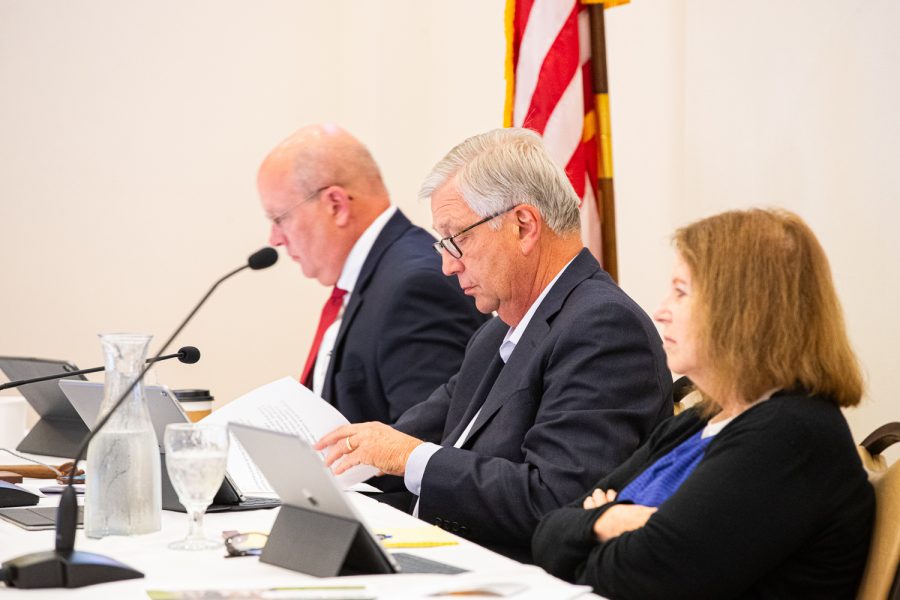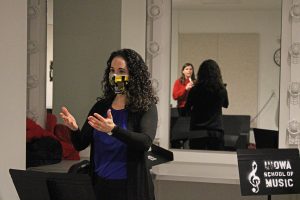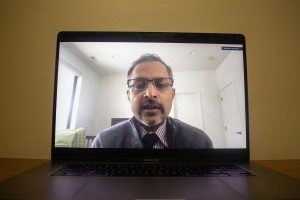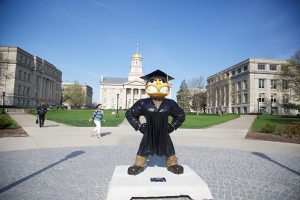State Board of Regents recommend changes to syllabi, campus policies regarding free speech
The state Board of Regents free speech committee presented its recommendations to the board regarding ways to protect freedom of expression on campus.
Iowa Board of Regents President Michael Richards sits alongside President Pro Tem Patty Cownie during a meeting at the Iowa State Alumni Center in Ames, Iowa, on Thursday, June 6, 2019. The Regents voted in favor of a four percent tuition increase starting in the fall semester of 2019.
February 24, 2021
The state Board of Regents’ free speech committee suggested several recommendations for Iowa’s regents institutions at its meeting Wednesday including requiring a free speech clause in all classes’ syllabi.
Board President Mike Richards announced the creation of the free speech committee at the board’s November 2020 meeting. He appointed regents David Barker, Nancy Boettger, and student regent Zach Leist to evaluate the implementations of the regents’ 2019 free speech policy.
At Wednesday’s meeting, Richards said the regents will not tolerate any violations of the First Amendment on its campuses across the state.
“[Freedom of speech] is, as a constitutional right, must be preserved and is sacred on our campuses,” he said. “The Board of Regents and our universities absolutely support free speech and open dialogue. Every faculty, staff, and student must feel confident that their constitutional rights are protected on our campuses, and that they will not face retribution for exercising their rights.”
He said there have been several recent events on campuses where this expectation has not been met. He said the board will continue to react quickly to freedom of speech violations on campuses and will take corrective action.
Four months after the committee formed, regents Barker, Boettger, and Leist recommended universities revise policies regarding free speech. They also suggested the board revise some of its policies.
Leist said he hopes the recommendations will receive action soon to minimize any further incidences of freedom of speech violations on campuses. He said that while it may not be perfect, addressing freedom of speech issues is the best way to create a beneficial learning environment.
“I do know that even with our recommendations we will not ever completely eliminate freedom of expression issues,” he said. “We all have the right not to agree with each other…however, something we should expect is respect.”
Barker said the regents will review and compile data from the most recent campus climate surveys to better understand freedom of speech issues on campus. He said the committee will determine if another survey is warranted in fall 2021. Later on in the presentation, the committee said it will conduct a freedom of expression survey every two years regardless of its findings.
While conducting those surveys, Boettger said the committee is also recommending that all regents universities be required to provide free training on freedom of speech to all students, faculty and staff members.
“The [institutions’] presidents will appoint the appropriate campus members to assist the free speech committee to develop a common model for free speech at all three universities,” she said. “[Also] each syllabus for each course at all regents universities [must] have a statement comparable to the ISU statement.”
Iowa State University adopted a freedom of speech statement that is required to be used in all university courses. The other regents universities do not have a similar statement.
The committee also recommends that universities adopt policies and procedures – including penalties – for violations of freedom of expression to the current processes there are in place for such infringements.
Barker said the board also needs to reaffirm that university resources will not be used for partisan activities.
“We [need to] establish a policy that universities may only take institutional positions on policy matters in conjunction with the board,” he said. “This includes presidents, vice presidents, deans, and department directors.”
In his institutional head presentation to the board, UI President Bruce Harreld said he supports the committee’s recommendations. He said the UI has already implemented many of the recommendations.
“Free speech and free expression are the cornerstones of our campus and our academic community,” he said. “As such, we rely on those fundamental principles both in and out of the classroom … Each and every member of our community must have the ability to have their voice heard, otherwise we are not fulfilling our core mission in education.”






